Time for reflectionpublished at 14:02 BST 4 September 2018
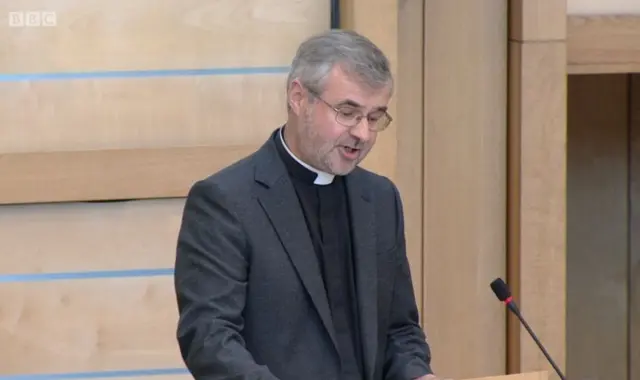
Reverend Canon Dominic Ind from St Saviour's Episcopal Church, Stirling is delivering today's time for reflection.
The first minister delivers the programme for government 2018-19
She pledges to increase capital investment year on year so that by 2025/6 investment in infrastructure will be £7bn higher than current projections
Programme for Government promises an increase of a quarter of a billion pounds for mental health provision over the next five years
The Scottish government pledges to meet settled status fees for EU citizens working in public services
£60m in funding for additional school counsellors
Louise Wilson and Craig Hutchison

Reverend Canon Dominic Ind from St Saviour's Episcopal Church, Stirling is delivering today's time for reflection.
Allow X content?
This article contains content provided by X. We ask for your permission before anything is loaded, as they may be using cookies and other technologies. You may want to read X’s cookie policy, external and privacy policy, external before accepting. To view this content choose ‘accept and continue’.
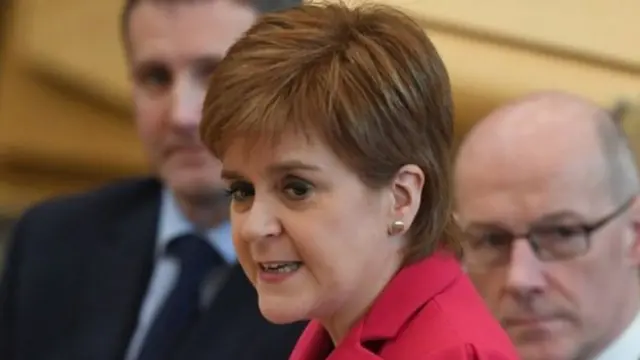 Image source, Getty Images
Image source, Getty ImagesNicola Sturgeon is expected to outline 12 new bills in her programme for government
The first minister is scheduled to deliver her programme for at 2.20pm after topical questions and this will be followed by opposition party leaders giving their reaction from 3pm.
Join us for extensive coverage and analysis throughout this afternoon and the rest of the week.
Topical questions will be on the British Transport Police, Ayr railway station and patient concerns around surgical procedures.
At 5pm we’ll have a member’s debate celebrating the recent European Championships in Glasgow and Berlin.
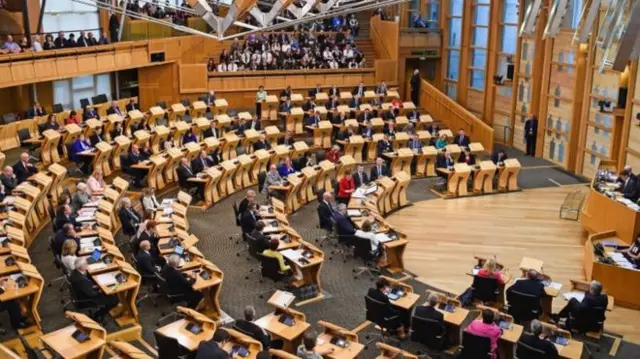 Image source, Getty Images
Image source, Getty ImagesNicola Sturgeon will open the new Holyrood term with a speech setting out her government's plans
First Minster Nicola Sturgeon is to set out her plans for the coming year as MSPs return to Holyrood after recess.
Ms Sturgeon will open the new year at the Scottish Parliament with a speech detailing her programme for government, kicking off around 2.20pm.
We'll bring you extensive coverage and analysis right here.
the first minister will announce a dozen new pieces of legislation, with focus expected to be on mental health, the environment and sustainable growth in the economy.
MSPs will spend the rest of the week debating the plans, with other parties also setting out their own priorities.
 Image source, Thinkstock
Image source, ThinkstockScottish child mental health waiting times were the worst on record between April and June, according to new figures.
Only 67.8% of the 4,664 children and young people who started their treatment during the three month period did so within the Scottish government's 18-week waiting time target.
The figure compares with 71.1% in the previous quarter and 80.7% for the same quarter in 2017, and is the worst on record since the target was set in 2014.
The Scottish Liberal Democrats described the statistics as "horrendous and heartbreaking".
Mental Health Minister Clare Haughey admitted they were "completely unacceptable".
The government set a standard for the NHS to deliver a maximum wait of 18 weeks from a patient's referral to treatment for specialist child and adolescent mental health services (CAMHS) from December 2014.
Allow X content?
This article contains content provided by X. We ask for your permission before anything is loaded, as they may be using cookies and other technologies. You may want to read X’s cookie policy, external and privacy policy, external before accepting. To view this content choose ‘accept and continue’.
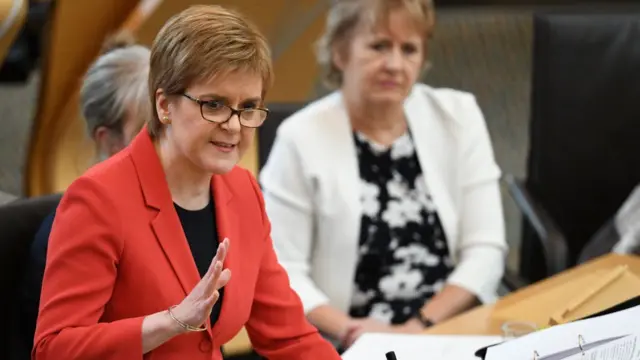 Image source, Getty Images
Image source, Getty ImagesNicola Sturgeon is to make "major announcements" on mental health, the economy and social security.
Ms Sturgeon will open the new year at the Scottish Parliament with a speech detailing her programme for government.
She will announce a dozen new pieces of legislation, with focus expected to be on mental health, the environment and sustainable growth in the economy.
MSPs will spend the rest of the week debating the plans, with other parties also setting out their own priorities.
Allow X content?
This article contains content provided by X. We ask for your permission before anything is loaded, as they may be using cookies and other technologies. You may want to read X’s cookie policy, external and privacy policy, external before accepting. To view this content choose ‘accept and continue’.
 Philip Sim
Philip Sim
BBC Scotland political reporter
MSPs are returning from their holidays for a new term at Holyrood. Brexit continues to dominate the political agenda, but what else will politicians have in their in-trays as they settle back in after the summer recess?
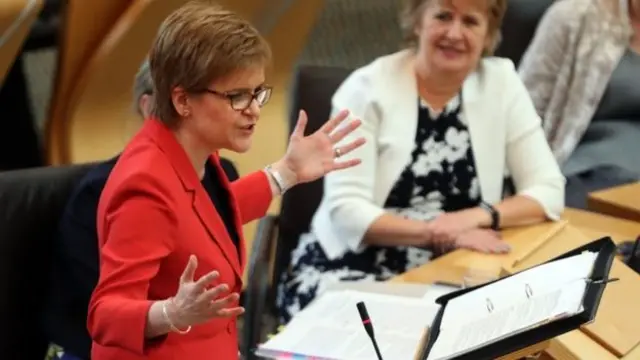 Image source, PA
Image source, PANo, there won't be any getting away from it. You can't move six inches in politics without tripping over Brexit.
There's every chance that within the month, the wheels will have fallen off the political clown car and we'll be staring down the barrel of a snap general election or another referendum.
But until the next seemingly inevitable crisis, Scotland's politicians have plenty to be getting on with. New ministers are settling into their jobs after June's dramatic reshuffle, and legislative proposals are piling up.
Here's a (relatively) Brexit-free guide to what MSPs will be focusing on over the next few months.
Allow X content?
This article contains content provided by X. We ask for your permission before anything is loaded, as they may be using cookies and other technologies. You may want to read X’s cookie policy, external and privacy policy, external before accepting. To view this content choose ‘accept and continue’.
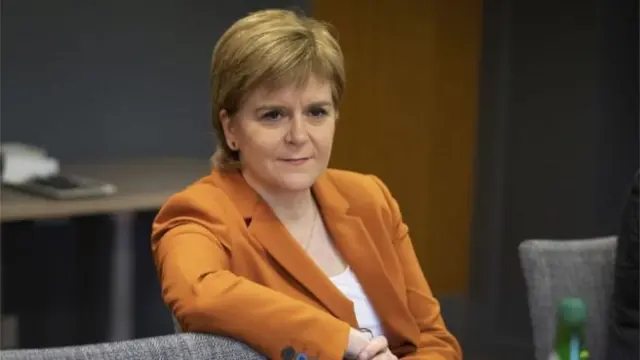 Image source, PA
Image source, PAThe first minister said Brexit must not "halt Scotland's progress"
Here's what we know and are expecting in Nicola Sturgeon's speech this afternoon:
Allow X content?
This article contains content provided by X. We ask for your permission before anything is loaded, as they may be using cookies and other technologies. You may want to read X’s cookie policy, external and privacy policy, external before accepting. To view this content choose ‘accept and continue’.
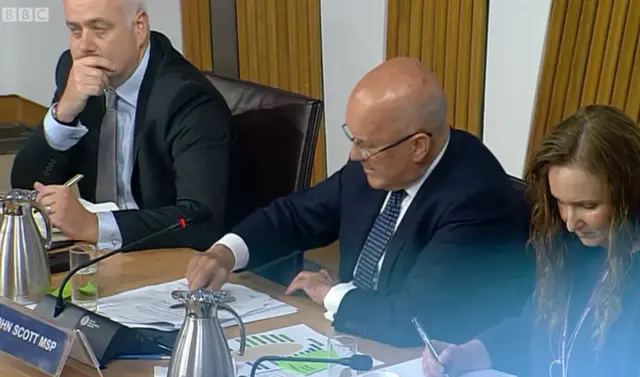 Image source, bbc
Image source, bbcFrancesca Osowska says she hopes she has demonstrated that investment in nature is a great example of preventative spend.
Committee convener John Scott wraps things up, thanking all the witnesses for giving evidence today.
Allow X content?
This article contains content provided by X. We ask for your permission before anything is loaded, as they may be using cookies and other technologies. You may want to read X’s cookie policy, external and privacy policy, external before accepting. To view this content choose ‘accept and continue’.
Allow X content?
This article contains content provided by X. We ask for your permission before anything is loaded, as they may be using cookies and other technologies. You may want to read X’s cookie policy, external and privacy policy, external before accepting. To view this content choose ‘accept and continue’.
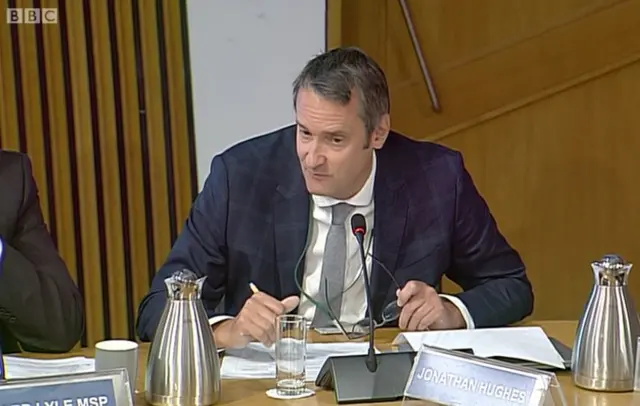
The cost of non-invasive species are estimated to be £200m a year, Mr Hughes tells MSPs.
Looking are biodiversity and protected places underpins a healthy environment, which means we are looking after future generations he adds.
Mr Hughes insists that we would be selling future generations down the line if we don't invest now.
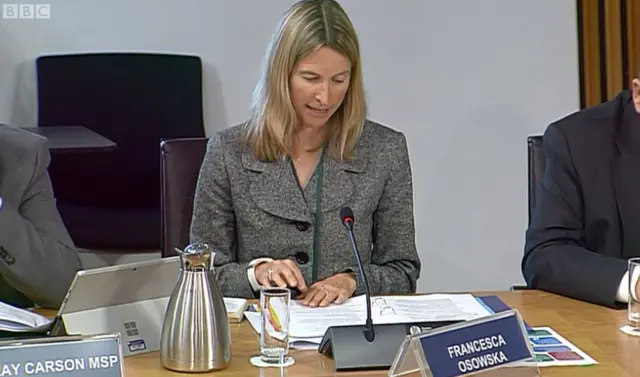 Image source, bbc
Image source, bbcScottish Natural Heritage's Francesca Osowska
Tory MSP Finlay Carson says there has been a perceived shift from SNH to considering urban plans and asks if there is a conflict in its other interests like biodiversity and protecting habitats.
Scottish Natural Heritage's Francesca Osowska explains 88% of project funding is for rural projects, with only 12% going to urban work.
"In terms of biodiversity that is our raison d'être," she adds.
SNH, at its core, is about improving nature and access to it, she says.
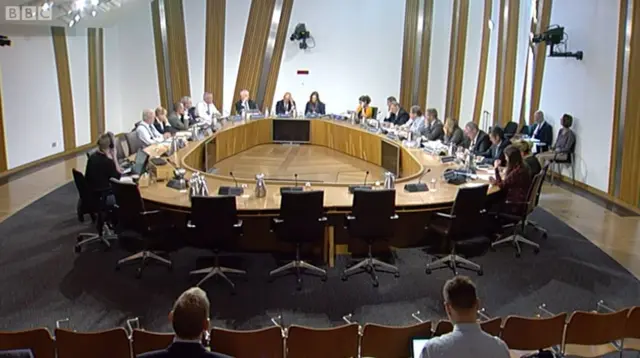
How can we track the impact of spend against the national outcomes, asks committee convener John Scott.
SNH's Francesca Osowska suggests further longitudinal analysis would be required though there is already plenty of information on outputs.
Phil Mackie from NHS Health Scotland says we rarely cost for future return.
Iain Gulland of Zero Waste Scotland suggests the key to success is identifying where work fits with the national outcomes, though he agrees more detailed analysis may need to go ahead.
Allow X content?
This article contains content provided by X. We ask for your permission before anything is loaded, as they may be using cookies and other technologies. You may want to read X’s cookie policy, external and privacy policy, external before accepting. To view this content choose ‘accept and continue’.
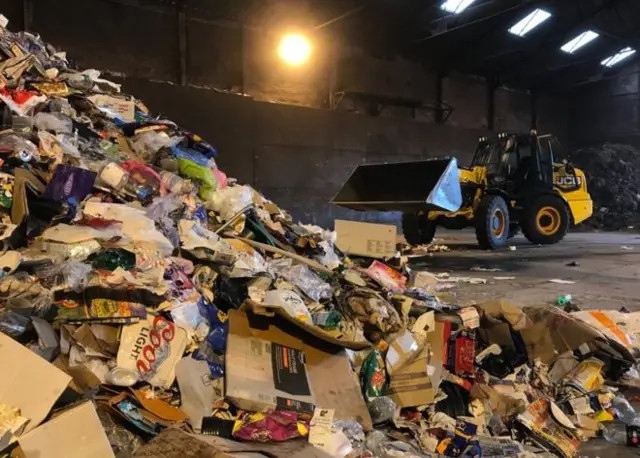
The committee is touching on waste, recycling and food waste.
Recycling reduces waste and saves money for local councils - but with more and more receptacles for different items, how many bins is too many?
In South Ayrshire, a new waste policy will see residents end up with six bins per household, some of which will only be collected every six weeks.
At the council's waste processing depot in Ayr, they recycle what they can, but currently only 52.5% of household waste is recycled, which means more than 24,000 tonnes a year ends up in landfill.
Kenny Dalrymple from the council's neighbourhood services says landfill is an expensive choice when recycling can earn cash.